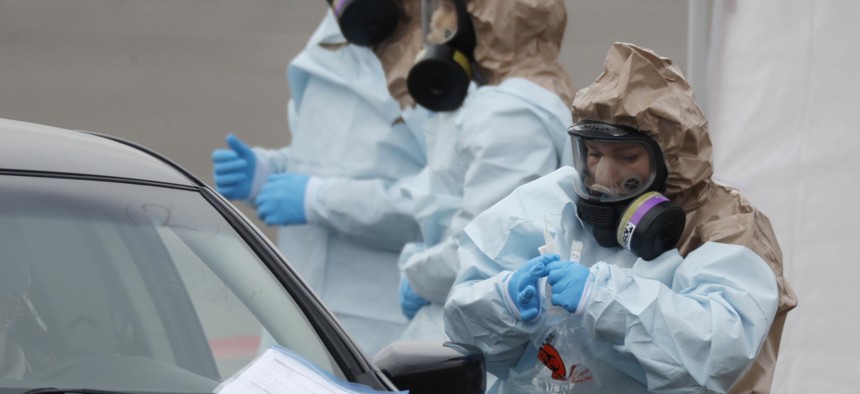Colorado Offers Guidance to Other Governments That Want to Establish Drive-Thru Testing

Medical workers in Colorado work to test patients for the coronavirus. AP Photo/David Zalubowski
The Colorado Department of Public Health and the Environment wants other state and local government agencies to know: yes, they can set up drive-thru testing.
Colorado last week became the first state to establish a drive-thru coronavirus testing center in the parking lot of the state lab in charge of processing Covid-19 tests.
For patients who receive a doctor’s authorization to get to the test—meaning they have a fever, respiratory symptoms, and fall into a high-risk group—the process is meant to be relatively quick and does not require them to leave their cars. Testing is free and does not require proof of insurance.
While drive-thru testing is also available at some private health centers around the country, state and local governments are just now starting to follow Colorado’s lead. New York opened its first drive-thru on Friday, available only to residents of Westchester County, the area where New Rochelle is located and an epicenter of the outbreak in the state. San Antonio also got its first drive-thru on Friday, and Texas Gov. Greg Abbott announced that the state would soon open others in Houston, Dallas, and Austin.
For state and local officials looking for guidance about how to establish drive-through testing centers, the Colorado Department of Public Health and the Environment offered advice to Route Fifty via email.
“In order to establish the drive-up model, it took planning and coordination between many departments including CDPHE, Denver Police Department, [and] Colorado State Patrol,” a representative from CDPHE said. “The coordination included looking at the layout of the drive through and traffic flow. Law enforcement controlled the entrance and exit of vehicles.”
They said it took about one week to organize the effort and that collaboration between departments was “vital.”
Drive-thrus should include several checkpoints throughout the line of vehicles where staff can check for doctor’s authorization and interview patients about their symptoms and personal demographics, the email said.
The Colorado health agency emphasized that there should be a rotating crew in order to ensure staff and physicians have breaks and stay hydrated. Every staff member should have properly fitted personal protective equipment, including gowns, gloves, and N95 masks, that are checked “prior to the day of the opening.” Staff that conduct the swabbing or come in close contact with patients should wear Powered Air Purifying Respirators, or PAPRs.
Before any test site opened, CDPHE said that officials should complete a walk through “to test efficiency” and “set specific times the lines are open or specify the number of cars allowed to go through each day.” Those who miss the cut off should be given a code or pass to come back the next day.
If sampling is taking longer than expected, they recommended making porta potties available to those who have to wait in their cars for extended periods of time.
The demand has been high. The Denver Post reported that Colorado’s drive-thru testing center closed early on Saturday because they did not have the capacity to test for all the drivers in line.
Dr. Nirav Shah, a senior scholar at Stanford University’s Clinical Excellence Research Center, told Route Fifty last week that drive-thru testing is “absolutely the right approach” for hospitals and public health departments but that “we need a more coordinated approach to this, instead of state-by-state or hospital-by-hospital.”
Doctors and public health officials across the country are scrambling to find efficient testing methods, but the U.S. still lags far behind the testing rates of other countries. South Korea, the first country to operate widespread drive-thru testing centers, has the capacity to check 15,000 patients for the disease each day.
The CDC has not yet released any guidance for local governments and hospitals that want to try drive-thru testing. Last week, Robert Redfield, director of the Centers of Disease Control and Prevention, told a House committee that the agency did not want to implement this kind of testing because they were “trying to maintain the relationship between individuals and their healthcare providers."
But on Sunday, the White House reversed course and said that they would explore opening drive-thru testing centers across the country. Dr. Deborah Birx, part of the White House's coronavirus task force, told NPR that people shouldn’t flood the test sites unless they’re high-risk. "I know everybody's going to want to go to these drive-thrus," she said.
OTHER STORIES on Route Fifty:
Emma Coleman is the assistant editor for Route Fifty.
NEXT STORY: How I Finally Got a Coronavirus Test






